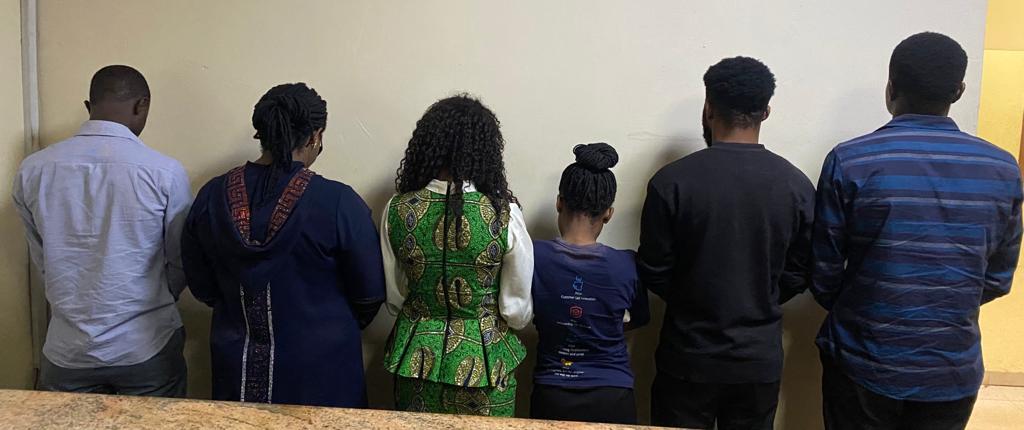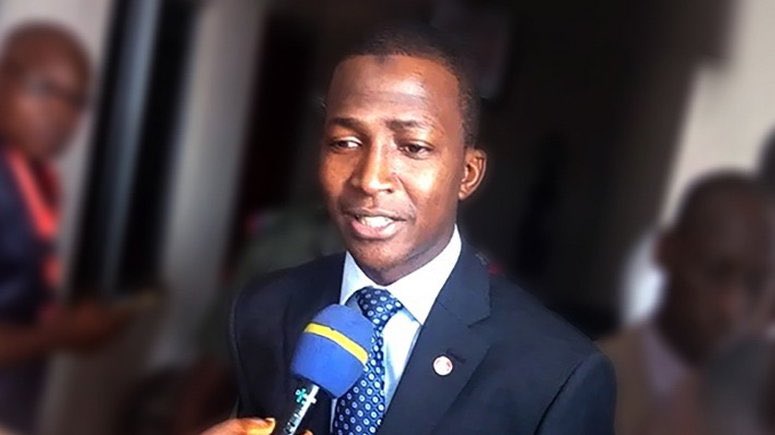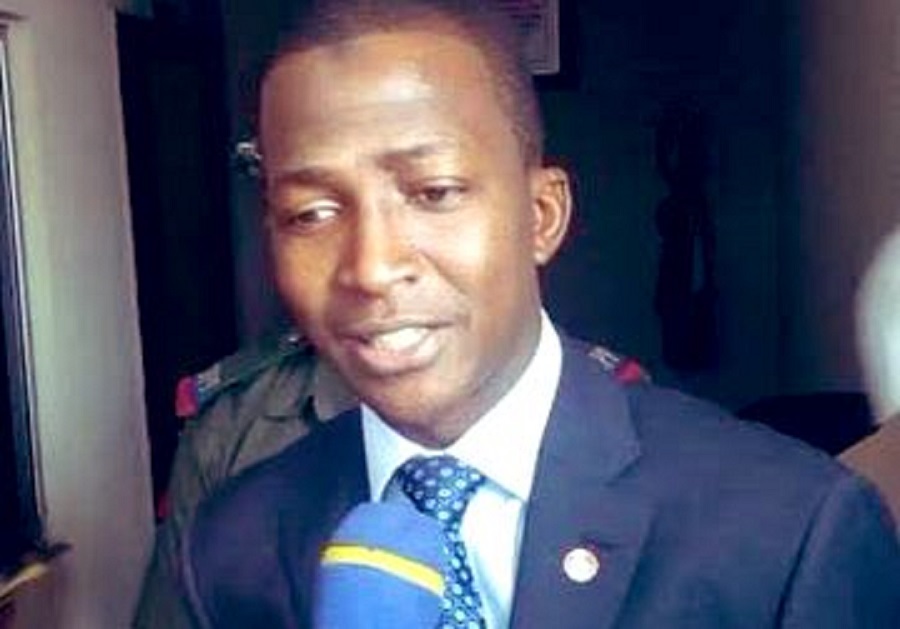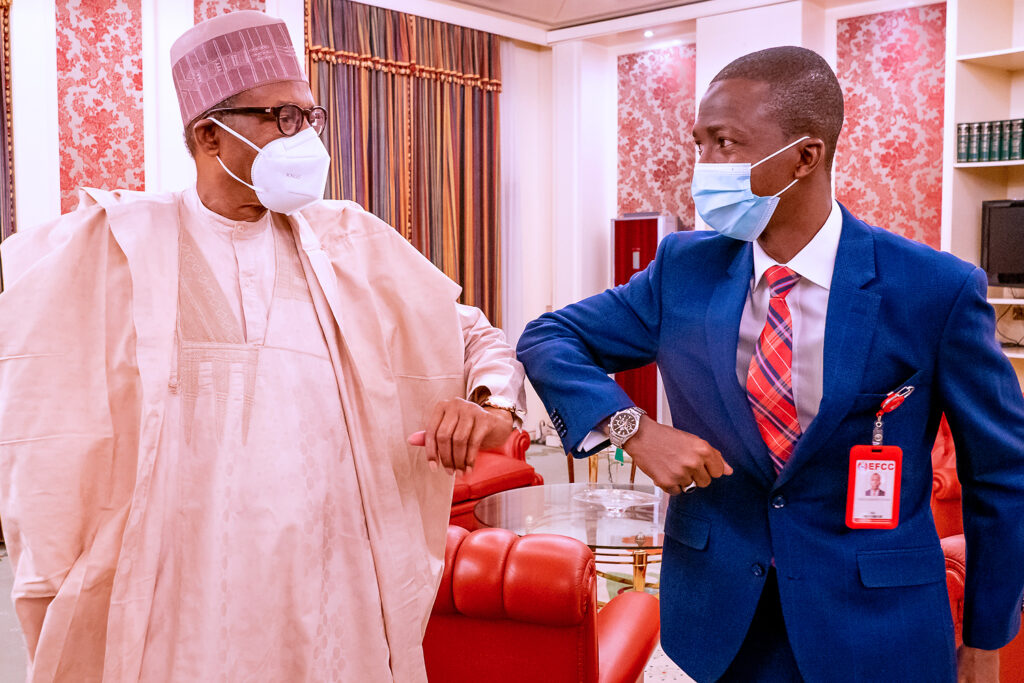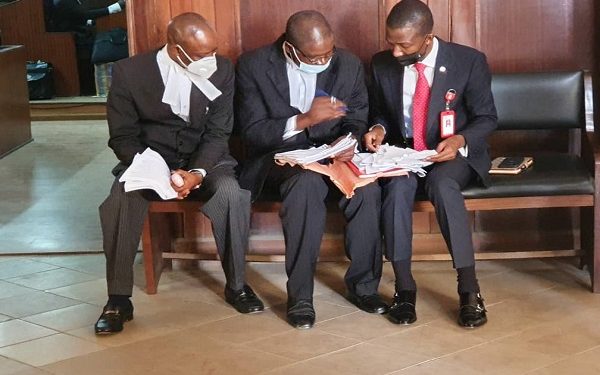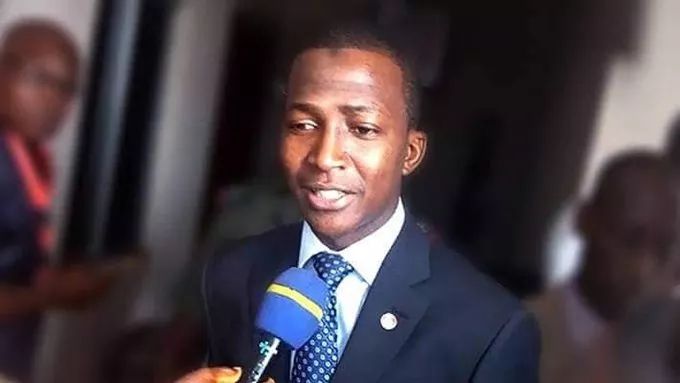By Godwin Etakibuebu
The Nigerian Senate on February 24 confirmed President Muhammadu Buhari’s appointment of Abdulrasheed Bawa as the new chairman of the Economic and Financial Crimes Commission (EFCC), marking the beginning of a new era for an organisation that has gone through nearly five years of leadership uncertainties and months of a probe that smeared its integrity.
Mr Bawa, a pioneer EFCC cadet officer from Course One of 2005, rose through the ranks to head the Ibadan, Port Harcourt and Lagos zonal offices of the commission at various times. A graduate of Economics from the Usmanu Danfodio University, Sokoto, and holder of a Master’s degree in International Affairs and Diplomacy from the same university, Mr Bawa has garnered vast investigation experience since joining the EFCC in 2004.
Many Nigerians also expect Bawa to step up the commission’s investigations to ensure water-tight cases that can earn conviction and recovery of looted asset.
His appointment comes with historic distinctions which he is expected to leverage on in steering the organisation in the right direction. The Kebbi State-born chair, who is the fifth person to hold the position, will be the first non-police officer, and at 40, the youngest person to head the agency since its establishment by former President Olusegun Obasanjo’s administration in 2003.
During his screening by the Senate, Mr Bawa told the lawmakers about his credentials and achievements in his 16 years of working at the EFCC, and promised to rebrand the commission. He also assured the lawmakers that the EFCC under his watch would work closely with strategic partners around the world, particularly in the recovery of looted asset, and ensures more transparency and accountability in its activities.
Beyond Mr Bawa’s promises, The Guru and other sources gathered the views of a cross-section of Nigerians, expressed in the media and in interviews, about what they [Nigerians] expect of him in his new role. Below are some of the key expectations the new EFCC Chairman is expected to meet.
INDEPENDENT WORKING RELATIONSHIP WITH AGF, OTHERS
Of all the misgivings many Nigerians have expressed about Mr Bawa’s appointment as the new EFCC chair, none of them is as widespread and strongly held as the belief that the commission’s independence, under his watch, will be totally submitted to the Attorney-General of the Federation, Abubakar Malami.
The view is rooted in the chain of events triggered by the enduring subtle hostility that existed between Mr Malami and the former acting chairman of the agency, Ibrahim Magu, which in turn led to the exit of Mr Magu and paved the way for Mr Bawa’s appointment.
The hostility between the two men reached its peak last year when Mr Malami levelled allegations of corruption and insubordination against Mr Magu, and the Ayo Salami panel was set up by the president to conduct a probe of the charges that put EFCC’s integrity to test. The probe brought about an upheaval that sent Mr Magu and other top officials of the commission on a suspension. Ibrahim Magu, who was appointed by President Buhari in acting capacity on November 9, 2015, never returned from the suspension slammed on him on July 7, 2020.
Both Magu and Bawa are believed to have enjoyed a good relationship up till 2019 when a crisis which ensued between them saw Bawa redeployed as the head of the Port Harcourt zonal office to the EFCC training academy in Abuja, a posting many considered a punishment.
It is believed that Bawa started getting closer to Abubakar Malami from that time up till when the probe by Mr Salami’s panel sparked by the AGF’s allegations led to Magu’s sudden exit. Many Nigerians fear that with the role Malami played in Magu’s exit, and in the choice of Bawa to lead the EFCC, coupled with the fact that the AGF and the new chair are both from Kebbi State, the agency will likely operate as a mere appendage of the AGF office.
Interestingly, a top anti-corruption adviser of President Buhari, Itse Sagay, shares this fear. Mr Sagay; a Professor of law and Senior Advocate of Nigeria [SAN], who is the chair of the Presidential Advisory Committee Against Corruption (PACAC), cited Malami’s alleged previous attempts to control the EFCC and interfere in the activities of anti-corruption agencies as the basis for his fear.
In September last year, Professor Sagay alleged that a bill which was largely credited to Malami in the media, was scheming to weaken the EFCC and turn it into an annex of the AGF office. A member of Sagay-led PACAC, Femi Odekunle, a professor of criminology who died of COVID-19 complications last December, had also blamed Magu’s ordeal leading to his suspension on Malami.
While the Magu-Malami crisis may have its peculiar features, it fits into the same pattern of turf wars between successive EFCC chairpersons and AGFs.
Nigerians now expect Bawa to walk the talk of his promise to run an independent EFCC and strike the much needed balance of ensuring a sound work relationship with the AGF office and other relevant institutions.
“I expect him to be sensitive to the unceremonious exits of his predecessors. If you look at the chairmanship of the EFCC from Ribadu to Magu, they all allowed themselves to be used at some point by the government and politicians.” “So, if Bawa is going to succeed, he should live up to the oath of his office, he should carry out the mandate of the oath of his office dispassionately,” said Inibehe Effiong, a human rights lawyer and anti-corruption crusader.
IMPARTIAL ANTI-CORRUPTION CRUSADE
President Buhari rode to power on three key promises to address the insecurity in the country, redeem the economy and lead a never-seen-before anti-corruption war. But almost six years down the line, President Buhari’s anti-corruption war is generally believed to be ineffective and one-sided over the years.
Many Nigerians believe that EFCC is generally by default, not inclined towards prosecuting powerful members of the ruling All Progressive Congress (APC) accused of infractions, but is eager to serve to be a witch-hunt tool against the opposition and critics of the current government.
For instance, PREMIUM TIMES had reported how the EFCC, in July 2019, withdrew the corruption charges against a former Gombe State governor, Danjuma Goje, who had been on trial for nearly eight years. Goje, then a senator who was aspiring to become the President of the 9th Senate, was being prosecuted by the EFCC for allegedly misappropriating N25 billion while in office as governor. But in a dramatic twist, Mr Goje after a meeting with Mr Buhari, dumped his aspiration to become the Senate President, to support Mr Buhari’s favourite candidate for the position, Ahmad Lawan. The subsequent withdrawal of the corruption case after it was taken over from the EFCC by the AGF’s office was generally seen as part of the deal struck at the presidential meeting.
Nigerians expect Bawa to reverse public perception that powerful APC members enjoy immunity from probe and prosecution while unevenly on the hot chase of perceived enemies of Buhari’s administration. Nigerians want an anti-graft agency that is confident and non-partisan in its fight against corruption.
“The state of the fight against corruption in Nigeria requires a boost. It needs someone who can be daring and without any recourse to any political meaning or affiliation. I expect that he is impartial and good,” Samson Itodo, a lawyer and Executive Director of YIAGA Africa, said in reference to Bawa’s appointment. Can Abdulrasheed Bawa achieve this expected task?
Respect human rights, stop parade of arrested suspects
The EFCC under its former acting chairman, Ibrahim Magu, was often accused of disregard for human rights, by indulging in indiscriminate arrest of suspects and parading them publicly as criminals when they had not been convicted.
A foremost Nigerian investigative-leading media; PREMIUM TIMES, in January last year, reported how Nigerians on social media berated EFCC over its arrests of 89 ‘Yahoo-Boys’ in a night club in Ibadan, the Oyo State capital. Only recently, the Federal High Court in Abuja also awarded a whopping N50 million damages against the commission for the indiscriminate arrest and detention of a defendant.
Many Nigerians also expect Bawa to step up the commission’s investigations to ensure water-tight cases that can earn conviction and recovery of looted asset.
However, with the emergence of Bawa, many Nigerians expect that the era of disregard for the rights of suspects should be done away with by the commission. Nigerians expect Bawa to live true to the provision of Section 36 of the Nigerian Constitution which stipulates that a person charged with a criminal offence shall be presumed to be innocent until proven in a competent court.
“For me, I think it is forced imprisonment if people are invited for questioning and honour EFCC invitation, detained and then asked to produce a surety to be released on bail. I think that infringes on the right of freedom of movement,” Mr Itodo also said.
The Guru’s personal encounter and engagement with Abdulrasheed Bawa in the Studio of Lagos Talks 91.3 FM, on Monday, December 14, 2020, before he was appointed the Chairman of the EFCC [I invited him to the Studio when he was the Zonal Head of EFCC in Lagos], he struck me as someone who has full respect for human rights and rules of law. We had about one hour interaction on topical issues during the segment of review of topical issues, which The Guru anchors, and he showed total abhorrence to arbitrary detention, disrespect to rules of law and trial by media, in his talk though – talk is cheap while walking the talk is harder most times.
Extradition of corruption suspects at large
Another concern raised against the agency in the past is its failure to extradite corruption suspects who fled abroad to evade prosecution or stall investigation. The most prominent person in this class of suspects is a former Minister of Petroleum Resources, Diezani Alison-Madueke, who left the country for the U.K. shortly after leaving office in 2015. Despite the criminal charges pending against her in Nigeria and series of court orders obtained by the EFCC for the forfeiture of her asset suspected to be proceeds of crime, bringing her to face trial in Nigeria has remained a mirage.
Magu had accused Malami; whose office is indispensable in matters of extradition, of frustrating the former minister’s extradition to Nigeria.
Incidentally, Bawa has headed the investigations of Diezani Alison-Madueke and her allies since 2015 and had previously traveled to the U.K. over the matter. Extraditing her and other suspects abroad is an area where Bawa is expected to collaborate effectively with Malami.
Can Bawa do anything dramatically better on this regards without collaborating, and even submitting to the ascendancy of the office of the Minister of Justice and Attorney General of the Federation?
Reversing the trend of losing anti-corruption cases
Many Nigerians also expect Bawa to step up the commission’s investigations to ensure water-tight cases that can earn conviction and recovery of looted asset.
Although the loss of some of the corruption cases in court by the EFCC, such as the one involving an ex-spokesperson of the Peoples Democratic Party (PDP), Olisa Metuh, are not attributable to shoddy investigations, many others such as the one involving an ex-presidential aide, Warimapo-Owei Dudafa, were dismissed by courts on grounds of insufficient evidence.
Yes, there are some cases being prosecuted in the courts by EFCC that fail test of diligence totally; due sometimes to corrupt human factor and at other times, due to corruptive intervention from higher quarters. This is not limited to the EFCC alone as similar trends are always seen in the Police Force, and even in the Secret Services. It is almost becoming the Nigerian trend, but this can be revised and corrected. Will Bawa become the champion of this “born-again” and “turning-around’ prosecutors? Let Abdulrasheed Bawa prove himself.
Stabilising and addressing internal lopsidedness
After his nomination as substantive chair of EFCC was twice rejected by the Senate, Magu was allowed by the president to lead the organisation in acting capacity for nearly five years. This brought about leadership uncertainties in the system with Magu entangled in the politics of securing Senate confirmation, especially after the new National Assembly came on board in June 2019.
This was still the situation when the turbulence of the Salami Panel’s probe came in July 2020, causing the suspension of Mr Magu and other top officials of the agency. The ripples of the probe have yet to disappear and Nigerians expect Mr Bawa to quickly restore stability, resolve the issues concerning the suspended officials and unify the organisation’s workforce that was divided along the line of who was for or against Magu.
One thing that was very obviously clear to keen watchers of events – those that are initiated within the system in Nigeria, remains the fact that President Muhammadu Buhari deliberately set Ibrahim Magu and the EFCC of the time up for failure. The President did much in destroying Ibrahim Magu, for whatever reasons best known to him. Fact of this postulation is laid on the revelation that the Directorate of State Security [DSS]’s report submitted to the Nigerian Senate; which was the authority of the Senate’s rejection of Ibrahim Magu, was shown to President Buhari before it went to the Senate.
What it meant is that the President knew how destructive the report was on his appointee. Yet, he allowed it [the report] to go to the Senate, while at the same time he drew a battle line against the Nigerian Senate for rejecting his nominee, and he did this two times.
Look at it this way. President Buhari held on to the “righteousness” of Ibrahim Magu, refused deliberately to make a replacement of him, leaving him there as Acting Chairman for five years until he set up a Commission of Enquiry; under [his own appointed] Justice Ayo Salami; probably with a “clear mandate to finish the man – Magu”, and to return verdict of guilty on the “righteous” man.
President Buhari gave! President Buhari took away! May the name of President Buhari be blessed!
More accountable EFCC
Many Nigerians spoken to want the EFCC under Bawa to be more accountable in management of recovered asset to avert suspicion that led to the establishment of the Ayo Salami panel to probe Magu and the EFCC. Over the years, there have been public suspicions about poor management and diversion of recovered asset by the EFCC officials.
Abdulrasheed Bawa is expected by Nigerians to put in place measures to address the lapses, issues of internal corruption, incompetence, and other sharp practices within EFCC that often lead to public outcry bordering on the integrity of the commission. If the truth is to be told, not too many of Bawa’s predecessors passed the litmus test of not hanging around with products. I sincerely hope he should be able to make a clear and distinctive difference to the glory of his curriculum vitae and youthful age.
Interagency collaboration, asset recovery
Bawa is also expected by Nigerians to collaborate effectively with other law enforcement and relevant agencies to ensure effective investigations, water-tight prosecution, and recovery of looted asset. Recovery of asset was scaled up under the leadership of Mr Magu as acting chair. Nigerians expect Mr Bawa to do more in identifying, tracing and recovering more of the looted assets.
Making the public own the anti-corruption war
Bawa has also been advised to prosecute the anti-corruption war with the support of the Nigerian public. Instead of making the war against graft appear to the public like a fight between the elites, Nigerians expect Bawa to integrate the public into the project and give them reasons to see it as something their survival depends on. He can achieve this by running the agency transparently and professionally, not being blinded by loyalty to the ruling class, and engaging robustly with the public.
Be a hope for the youth
The emergence of the 40-year-old has been lauded by advocates of ‘youth in government’. Abdulrasheed Bawa himself admitted he would be carrying the badge of the youth in his position as the EFCC chair. ‘’I’m not unaware of the fact that my nomination caused a lot of hope for the teeming youth around the country,” he said during his senate screening.
Promising to be a good ambassador for the youth, he said, “I want to state that I will give the youth a very good representation so that at the end of the day more youth will be given huge responsibility in the country.” Bawa said this last two weeks at the Senate during his pre-confirmation screening.
It is expected that the new Executive Chairman of the Economic and Financial Crime Commission will wage a successful anti-corruption war to help validate the competence of young Nigerians to hold important leadership positions.
And the little l know of him tells me that he will achieve this onerous mandate, even as he takes Command of Control in this Nigeria’s Ship of Destiny sailing into the Nigerian High Sea of uncertainty.
The Guru wishes Abdulrasheed Bawa a very successful voyage!
- Most of the resources for this narration are pulled from the Premium Times.
Godwin Etakibuebu; a veteran Journalist, wrote from Lagos.
Contact:
Website: www.godwintheguru.com
Twitter: @godwin_buebu
Facebook: Godwin Etakibuebu
Facebook Page: Veteran Column
Phone: +234-906-887-0014 – short messages only.
You can also listen to this author [Godwin Etakibuebu] every Monday; 9:30 – 11am on Lagos Talk 91.3 FM live, in a weekly review of topical issues, presented by The News Guru [TNG].



